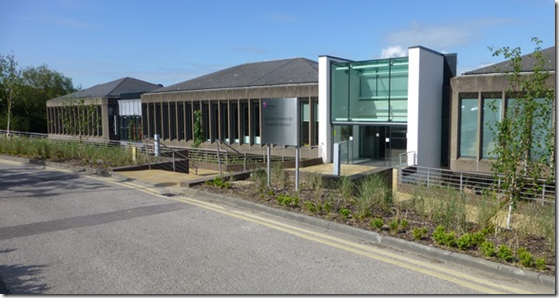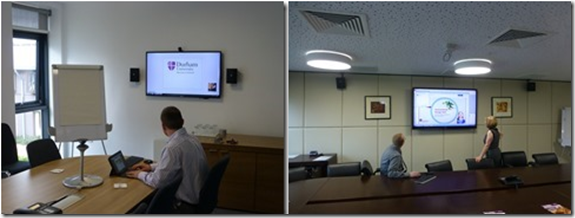Making an impact with Lync in education
The following post was contributed by Ben Lee , the team leader for Unified Communications at Waterstons, a business and IT consultancy based in Durham and London.
As an IT Professional (I am very proud of that term) one of the things that always provides me with the most job satisfaction is being able to see people benefiting from the solutions that I have implemented, particularly if the deployment has been challenging. As a consultant, sometimes I miss out on being able to fully appreciate the real-world impact of my work as I am not always involved in the entire project delivery. Having said that, I'm fortunate enough to work for a company where we have long standing relationships with our clients and work in genuine partnership so the satisfaction ratio for me is high. Unfortunately, however good the client relationship is, it doesn't guarantee that the road to delivery and golden moment of success is any easier. Technology will always be tricky but it is my job to minimise the risks and reach a successful delivery (This is where PowerShell helps these days right?).
That’s why the theme of this month's TechNet flash caught my eye - "Making an impact". It made me recall some recent unexpected feedback I'd heard when catching up with one of our site managers. He mentioned about how some users had really taken a Lync deployment to heart and were using it in a way we hadn't initially envisaged….
The project in question involves Durham University Business School. The Business School has worked with Waterstons for many years and we provide a full time IT manager who coordinates the onsite IT support, manages the infrastructure, as well as managing some aspects of project delivery for them.

Back in March 2012 the Business School embarked on a large scale redevelopment programme and essentially had to move out of their building and spread themselves over 5 sites across Durham city. I was asked to evaluate their options to help reduce the impact of this migration on working practices and it was agreed that their legacy OCS 2007 environment would be upgraded to Lync 2010. At the time the subsequent deployment suffered from several technical issues and we had a hard time driving user adoption. However in the early part of 2013 there was a requirement within the technology design for the Business School’s new building to select a solution that would underpin the School's collaboration and video conferencing needs. Once again it seemed that Lync would be able to fit the bill and the improvements added in Lync 2013 would better address their needs. It was also possible this time round to re-visit some of the technical limitations we had encountered during the 2010 deployment that had caused low usage.
The project was a Microsoft geeks dream as it included all sorts of cool technologies; Active Directory trusts, Identity synchronisation, cross-domain authentication, SIP trunks for dial-in conferencing, multiple Lync pools and Polycom hardware video conferencing units. After a few months of tight deadlines and interesting issues that required some lateral thinking we had successfully sorted the technology side of the project out and were satisfied that everything was working as it should, which left us with the user training & adoption. This time round, having learned from our mistakes, our onsite IT manager embarked on a full program of user training sessions backed up by a SharePoint Lync wiki where users can share tips and tricks. Unlike the first deployment we started to see some proper user adoption with people communicating cross-department and with external partners. So far so good, but roll forward a few months and Lync had really started to become embedded into the Business School users working practices.

The Business School were embarking on a new study program where they partnered with a large accountancy organisation who sent students onsite before they returned to continue studying remotely. The Business School suddenly had a requirement to run remote revision sessions while the students were offsite. In the past there had been issues with the technology requirements to support such sessions - but not anymore with Lync. After a few practice sessions to prove the concept they were away!
Using Lync the Business School were able to hold four half-day sessions over two days with at least 50 students per slot. The sessions were configured so that the lecturer locked down the room, muted all the students and shared their screen and video. Students could still interact via chat and the recently added Lync Q&A functionality. The students joined the sessions using their web browser and needed nothing installing beyond the Lync web-plugin. They had all been notified ahead of time to request a USB headset for the audio portion of the calls but those who forgot were able to dial-in to the meeting using the Lync SIP trunk. This is the sort of use-case that should work perfectly in theory but is usually fraught with issues where people can't join or have audio issues etc… We needn't have worried. The whole process apparently worked so well that on the second day there was zero IT involvement at all, the lecturer and program manager set everything up themselves, invited the students and managed the conference from start to finish! To top it all off they recorded the sessions using the built in Lync recording manager and then made them available for anyone who hadn't been able to attend at the time.
The study program had been so successful that the Business School is planning on running other courses in this way and they will continue to use Lync to deliver the remote training elements of the study program!
So there you have it, I don't know about you but like I said at the start there is really nothing better than hearing about how something you worked hard to deploy has been used in new and interesting ways. It's the sort of job satisfaction that you just can't beat and is hopefully something you can relate to. I'm looking forward to hearing where else Lync might make an impact for Durham University Business School.
We loved hearing about how an implementation was put to good use, have you got a similar story? We’d love to hear it, just reach out to us ukitpro@microsoft.com or via @TechNetUK .
